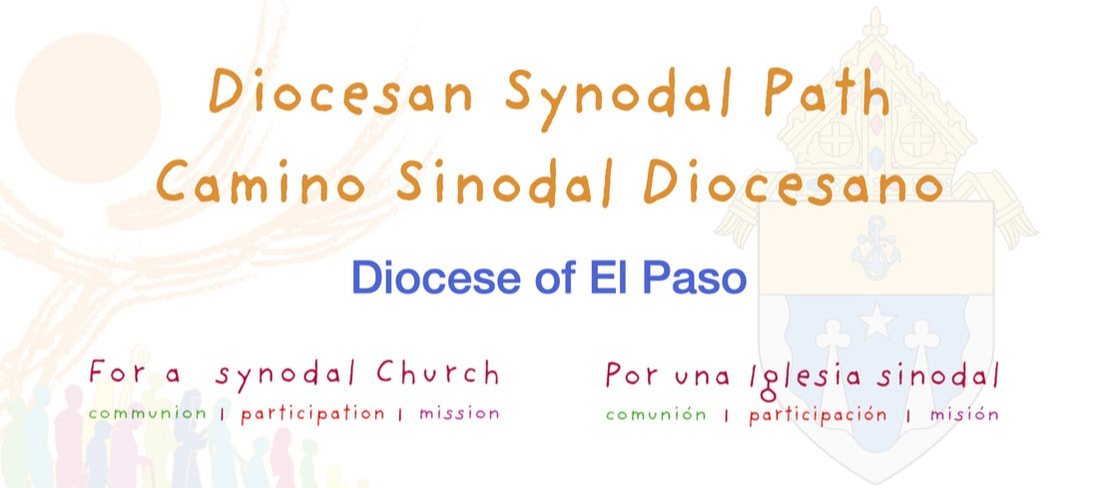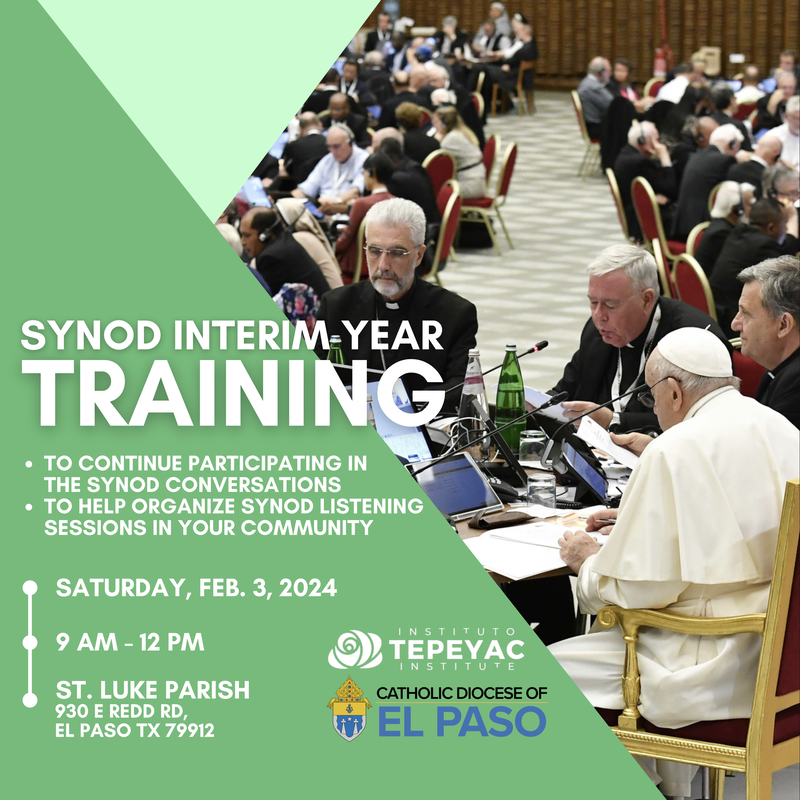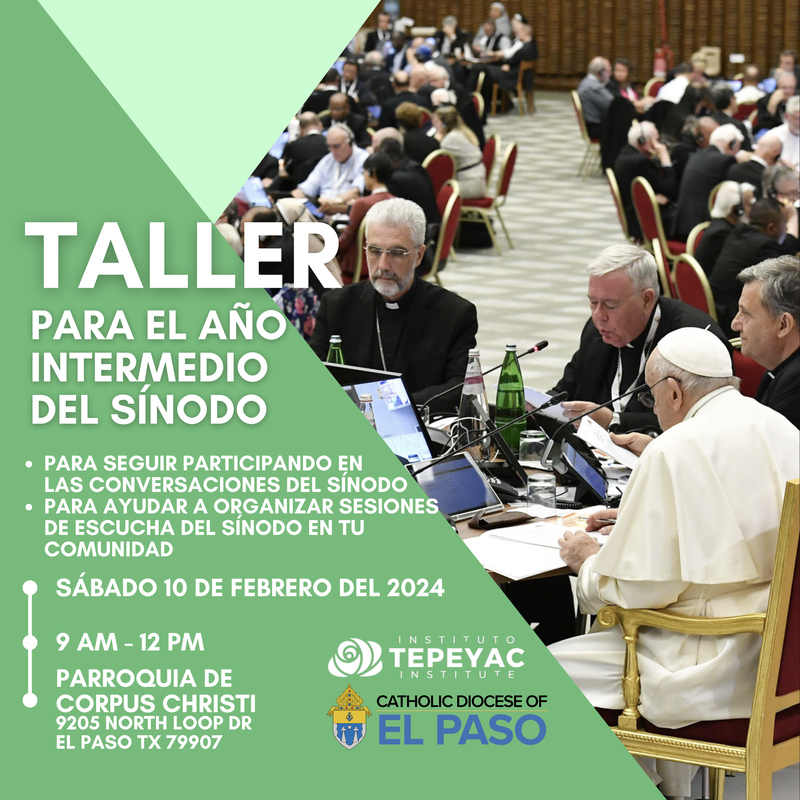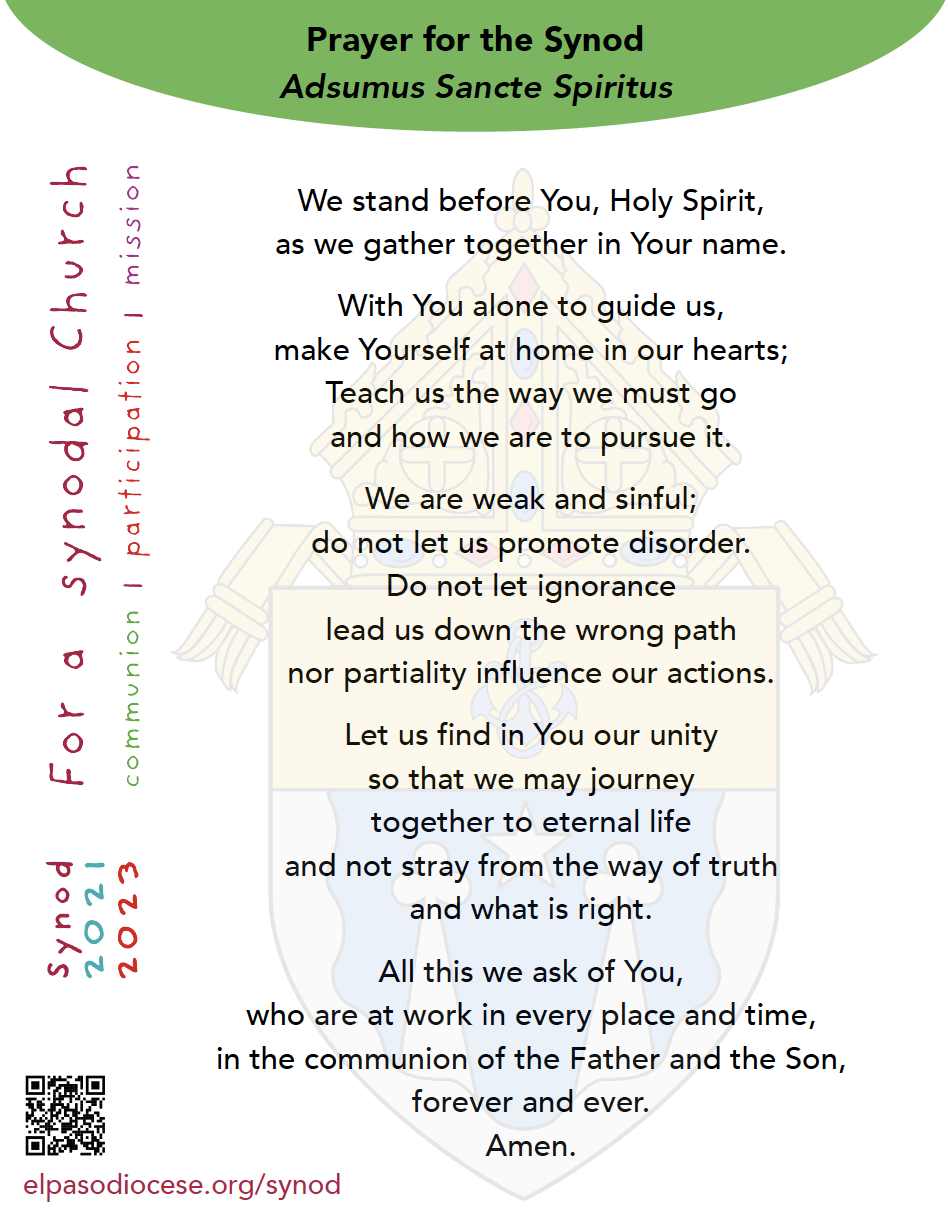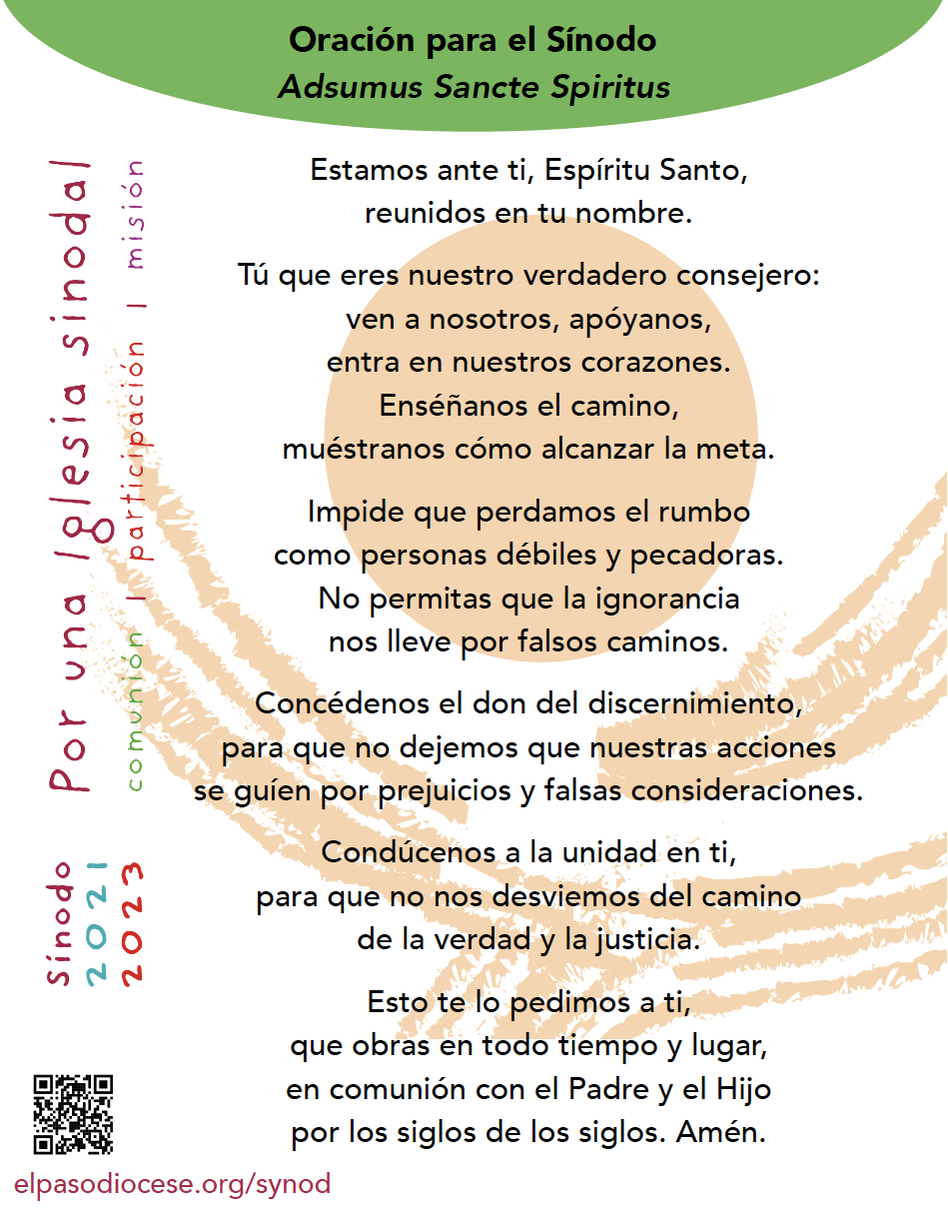What happened in the Synod? WHat is Next?In October 2023, the XVI Assembly of the Synod of Bishops gathered in Rome to continue the synodal process that began in every diocese of the world since 2021. The Synod Assembly, which for the first time was composed not only of bishops, but also of priests, deacons, religious sisters and brothers, and male and female lay leaders, dealt with the many important themes that emerged at the diocesan, national, and continental levels of the process.
Some of these themes, contained in the Synthesis Report A Synodal Church in Mission (which can be found below in the section "Important Documents"), were: the experience of being a Catholic community, the relation to other non-Catholic churches and confessions, the role of different groups in the life of the Church (the poor, the youth, those with disabilities, women, the clergy, among others), and the mission of the Church in the current world (listening and accompanying people in different situations in life, discerning new questions of modernity, mission in the digital environment, fostering the participation of all the faithful in decision-making processes, forming all Catholics to be missionary disciples, etc.). The desire of the Synod Assembly, which will gather again in October 2024 to finalize its discussions, is that all dioceses continue reflecting on these topics in order to enrich the conversations of the upcoming Assembly. Based on their experience of the themes mentioned above and on the contents of the Synthesis report, all the baptized are asked to participate in listening sessions and to consider these two questions contained in the Guide for the Listening Sessions of the Synod Interim Year (found below under "Important Documents"):
|
¿Qué Pasó en El Sínodo? ¿Que Sigue?En octubre de 2023, la XVI Asamblea del Sínodo de los Obispos se reunió en Roma para continuar el proceso sinodal que comenzó en todas las diócesis del mundo desde 2021. La Asamblea del Sínodo, que por primera vez estuvo compuesta no solo por obispos, sino también por sacerdotes, diáconos, religiosas, religiosos, laicas y laicos, trató los muchos temas importantes que surgieron en el proceso a nivel diocesano, nacional y continental.
Algunos de estos temas, que se pueden encontrar en el Informe de Síntesis Una Iglesia Sinodal en Misión (disponible más abajo en la sección "Documentos Importantes"), son: la experiencia de ser una comunidad católica, la relación con otras iglesias y confesiones no católicas, el papel de los diferentes grupos en la vida de la Iglesia (los pobres, los jóvenes, los discapacitados, las mujeres, el clero, entre otros), y la misión de la Iglesia en el mundo actual (escuchar y acompañar a las personas en diferentes situaciones de vida, discernir nuevas cuestiones de la modernidad, la misión en el entorno digital, fomentar la participación de todos los fieles en los procesos de toma de decisiones, formar a todos los católicos para que sean discípulos misioneros, etc.). El deseo de la Asamblea del Sínodo, que se reunirá de nuevo en octubre de 2024 para finalizar sus discusiones, es que todas las diócesis continúen reflexionando sobre estos temas con el fin de enriquecer las conversaciones de la próxima Asamblea. Basándose en su experiencia de los temas mencionados anteriormente y en el contenido del informe de síntesis, se pide a todos los bautizados que participen en sesiones de escucha y que reflexionen sobre estas preguntas que se encuentran en la Guía para las Sesiones de Escucha del Año Intermedio del Sínodo (disponible más abajo en "Documentos Importantes"):
|
Important Documents
|
Documentos Importantes
| ||||||||||||||||||||||||
Other Earlier Documents
|
Otros Documentos Anteriores
| ||||||||||||||||||||||||||||||||||||
ABOUT THE SYNODAL PATH
What do synod and synodality mean? (From the Vademecum for the Synod on Synodality)
The International Theological Commission (ITC) describes synodality this way: ‘Synod’ is an ancient and venerable word in the Tradition of the Church [...] It indicates the path along which the People of God walk together. Equally, it refers to the Lord Jesus, who presents Himself as ‘the way, the truth and the life’ (Jn 14,6), and to the fact that Christians, His followers, were originally called ‘followers of the Way’ (cf. Acts 9,2; 19,9.23; 22,4; 24,14.22). First and foremost, synodality denotes the particular style that qualifies the life and mission of the Church, expressing her nature as the People of God journeying together and gathering in assembly, summoned by the Lord Jesus in the power of the Holy Spirit to proclaim the Gospel. Synodality ought to be expressed in the Church’s ordinary way of living and working. In this sense, synodality enables the entire People of God to walk forward together, listening to the Holy Spirit and the Word of God, to participate in the mission of the Church in the communion that Christ establishes between us. [...] The current Synodal Process we are undertaking is guided by a fundamental question: How does this “journeying together” take place today on different levels (from the local level to the universal one), allowing the Church to proclaim the Gospel? and what steps is the Spirit inviting us to take in order to grow as a synodal Church? (Preparatory Document, 2) In this light, the objective of the current Synod is to listen, as the entire People of God, to what the Holy Spirit is saying to the Church. We do so by listening together to the Word of God in Scripture and the living Tradition of the Church, and then by listening to one another, and especially to those at the margins, discerning the signs of the times. In fact, the whole Synodal Process aims at fostering a lived experience of discernment, participation, and co-responsibility, where a diversity of gifts is brought together for the Church’s mission in the world. |
ACERCA DEL CAMINO SINODAL¿Qué significan sínodo y sinodalidad? (Del Vademecum para el Sínodo sobre la Sinodalidad)
La Comisión Teológica Internacional (CTI) describe la sinodalidad de esta manera: ‘Sínodo’ es una palabra antigua muy venerada por la Tradición de la Iglesia, […] indica el camino que recorren juntos los miembros del Pueblo de Dios. Remite por lo tanto al Señor Jesús que se presenta a sí mismo como “el camino, la verdad y la vida” (Jn 14,6), y al hecho de que los cristianos, sus seguidores, en su origen fueron llamados «los discípulos del camino» (cfr. Hch 9,2; 19,9.23). La sinodalidad designa ante todo el estilo peculiar que califica la vida y la misión de la Iglesia expresando su naturaleza, como el caminar juntos y el reunirse en asamblea del Pueblo de Dios convocado por el Señor Jesús en la fuerza del Espíritu Santo para anunciar el Evangelio. Debe expresarse en el modo ordinario de vivir y obrar de la Iglesia. En este sentido, la sinodalidad permite a todo el Pueblo de Dios caminar juntos, en escucha del Espíritu Santo y de la Palabra de Dios, para participar en la misión de la Iglesia en la comunión que Cristo establece entre nosotros. [...] El actual Proceso Sinodal que estamos llevando a cabo está guiado por una pregunta fundamental: ¿Cómo se realiza hoy este “caminar juntos” en los distintos niveles (desde el local hasta el universal), permitiendo a la Iglesia anunciar el Evangelio? y ¿qué pasos nos invita a dar el Espíritu para crecer como Iglesia sinodal? (Documento Preparatorio, 2) En este sentido, el objetivo del actual Sínodo es escuchar, como todo el Pueblo de Dios, lo que el Espíritu Santo dice a la Iglesia. Lo hacemos escuchando juntos la Palabra de Dios en la Escritura y en la Tradición viva de la Iglesia, y luego escuchándonos unos a otros, y especialmente a los que están en los márgenes, discerniendo los signos de los tiempos. De hecho, todo el Proceso Sinodal pretende promover una experiencia vivida de discernimiento, participación y corresponsabilidad, en la que se reúne una diversidad de dones para la misión de la Iglesia en el mundo. |

